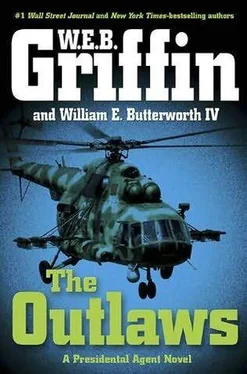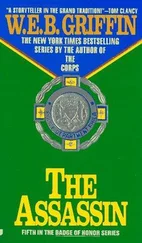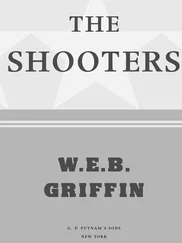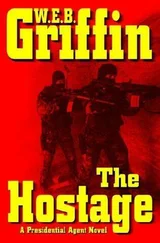W Griffin - The outlaws
Здесь есть возможность читать онлайн «W Griffin - The outlaws» весь текст электронной книги совершенно бесплатно (целиком полную версию без сокращений). В некоторых случаях можно слушать аудио, скачать через торрент в формате fb2 и присутствует краткое содержание. Жанр: Триллер, на английском языке. Описание произведения, (предисловие) а так же отзывы посетителей доступны на портале библиотеки ЛибКат.
- Название:The outlaws
- Автор:
- Жанр:
- Год:неизвестен
- ISBN:нет данных
- Рейтинг книги:3 / 5. Голосов: 1
-
Избранное:Добавить в избранное
- Отзывы:
-
Ваша оценка:
- 60
- 1
- 2
- 3
- 4
- 5
The outlaws: краткое содержание, описание и аннотация
Предлагаем к чтению аннотацию, описание, краткое содержание или предисловие (зависит от того, что написал сам автор книги «The outlaws»). Если вы не нашли необходимую информацию о книге — напишите в комментариях, мы постараемся отыскать её.
The outlaws — читать онлайн бесплатно полную книгу (весь текст) целиком
Ниже представлен текст книги, разбитый по страницам. Система сохранения места последней прочитанной страницы, позволяет с удобством читать онлайн бесплатно книгу «The outlaws», без необходимости каждый раз заново искать на чём Вы остановились. Поставьте закладку, и сможете в любой момент перейти на страницу, на которой закончили чтение.
Интервал:
Закладка:
"No. It could be full of cold beer. These fuckers would love to be able to tell the story of the dumb fucks from La Migra who shot up a cooler full of cerveza."
Guillermo took a closer look at the container.
"It's got signs on it," he said.
He reached into the station wagon and came out with a battered pair of binoculars.
After a moment, he said, "It says, 'Danger: Biological Hazard.' What the fuck?"
He handed the binoculars to Hernandez, who took a close look.
He exhaled audibly, then reached for his cell phone and hit a speed-dial number.
"Hernandez here," he said into it. "I need a supervisor out here, right now, at mile thirty-three."
There was a response, to which Hernandez responded, "I'll tell him when he gets here. Just get a supervisor out here, now." Ten minutes later, a Bell Ranger helicopter settled to the ground at mile thirty-three.
Two men got out. Both had wings pinned to their uniforms. One was a handsome man with a full head of gray hair and a neatly trimmed mustache. He had a gold oak leaf pinned to his uniform collar points. In the Army, it would be a major's insignia. Field Operations Supervisor Paul Peterson was known, more or less fondly, behind his back as "Our Gringo."
The second man, who had what would be an Army captain's "railroad tracks" pinned to his collar points, was Supervisory Border Patrol Agent Domingo Garcia. He was known behind his back as "Hard Ass."
Both men walked to Hernandez and Amarilla, who were leaning against their Jeep station wagon.
"What have you got?" Hard Ass inquired not very pleasantly.
Hernandez pointed to the obstruction in the road, then handed the binoculars to Peterson.
Peterson peered through them and studied the obstruction. After a long moment, he said, "What in the fuck is that?" [TWO] Ministro Pistarini International Airport Ezeiza Buenos Aires Province, Argentina 1135 5 February 2007 At the same moment that Supervisory Border Patrol Agent Domingo "Hard Ass" Garcia had put the binocs to his eyes-when it was 0835 in McAllen, Texas, it was 1135 in Buenos Aires-Roscoe J. Danton of The Washington Times-Post stepped off the ramp leading from Aerolineas Argentinas Flight 1007. As he entered the Ezeiza terminal proper, he thought for a moment that he had accidentally gone through the wrong door. He found himself in a large duty-free store, complete with three quite lovely young women handing out product-touting brochures.
"Clever," he said, admiringly and out loud.
Someone down here has figured out a good way to get the traveling public into the duty-free store: place the store as the only passage between the arriving passenger ramp and the terminal.
But screw them. I won't buy a thing.
He started walking through the store.
Fifty feet into it, though, he had a change of heart. He had come to a display of Johnnie Walker Black Label Scotch whisky, and remembered what he had learned as a Boy Scout: "Be Prepared."
Three boxes of his favorite intoxicant were cellophane-wrapped together and offered at a price he quickly computed to be about half of what he paid in Washington, D.C.
He picked up one of the packages and went through the exit cash register, charging his purchase to his-actually, The Washington Times-Post's-American Express corporate credit card. He examined his receipt carefully and was pleased. It read that he had charged $87.40 for unspecified merchandise in the store.
If it had said "three bottles Johnnie Walker Black Label Scotch," there would have been a note from Accounting reminding him that intoxicants could be charged to The Washington Times-Post only when connected to business entertaining, and as he had not identified on his expense report whom he had entertained, it was presumed that the whisky was for his personal consumption and therefore the $87.40 would be deducted from his next paycheck, and in the future, please do not charge personal items to the corporate credit card.
Accounting, he theorized, would probably give him the benefit of the doubt in this instance because it didn't say "whisky" and assume he had purchased, for example, items of personal hygiene, which were considered legitimate expenses when he was traveling.
Or maybe a battery for his-The Washington Times-Post's-laptop computer.
He would not lie on his expense account. But he would take full advantage of the provisions regarding business travel in his employment contract.
He was entitled, for example, to first-class accommodations on airliners when traveling outside the continental United States on a flight lasting six hours or longer. On flights under six hours in length-say, Washington-London-his contract provided for business class.
It was for that reason that he had traveled on Aerolineas Argentinas. When The Washington Times-Post Corporate Travel department had told him that only business class was available on Delta and American, he made them, per his contract, book him first-class seating on the Argentine carrier. His experience had taught him that once he accepted less than that to which he was entitled, the bastards in Corporate Travel henceforth would try to make it the rule.
Danton also was entitled by his contract, when on travel lasting more than twenty-four hours, to a hotel rated at four stars or better and, therein, a two-room suite rather than a simple room.
In the case of this trip, Corporate Travel had suggested they make a reservation for a two-room suite for him at the four-star-rated Plaza Hotel in Buenos Aires. The Plaza wasn't a five-star hotel but boasted that it contained the oldest restaurant in Buenos Aires, a world-famous bar, and was directly across Plaza San Martin from the Argentine foreign ministry. To Danton, that suggested that it wasn't going to be the Argentine version of a Marriott, and he had accepted Corporate Travel's recommendation.
Carrying the Johnnie Walker, he went through the immigration checkpoint without any trouble. His luggage, however, took so long to appear on the carousel that he became genuinely worried that it had been sent to Havana or Moscow. But it did finally show up, and he changed his suspicions toward the officers of the Transportation Security Administration back in Miami, who were, he thought, entirely capable of putting some clever chalk mark on his luggage signaling everyone in the know that it belonged to an "uncooperative traveler" and, if it couldn't be redirected to Moscow or Havana, then to the absolute end of whatever line it was in.
When the customs officials sifted through his suitcase and laptop briefcase with great care-and especially when they asked him if he was sure he was not trying to carry into the Republica Argentina more than ten thousand U.S. dollars in cash or negotiable securities or any amount of controlled substances-he was sure he saw the stealthy hand of the TSA at work.
Corporate Travel had told him that he should take a remise rather than a taxi from the airport to his hotel, explaining that Buenos Aires taxis were small and uncomfortable, and their drivers well-known for their skilled chicanery when dealing with foreigners. Remises, Travel had told him, which cost a little more, were private cars pressed into part-time service by their owners, who were more often than not the drivers. They could be hired only through an agent, who had kiosks in the terminal lobby.
The remise in which Roscoe was driven from Ezeiza international airport to Plaza San Martin and the Plaza Hotel was old, but clean and well cared for. And the driver delivered a lecture on Buenos Aires en route.
When the remise door was opened by a doorman wearing a gray frock coat and a silk top hat, and two bellmen stood ready to handle the baggage, Roscoe was in such a good mood that he handed the remise driver his American Express card and he told him to add a twenty-percent tip to the bill. Ten percent was Roscoe's norm, even on The Washington Times-Post 's dime.
Читать дальшеИнтервал:
Закладка:
Похожие книги на «The outlaws»
Представляем Вашему вниманию похожие книги на «The outlaws» списком для выбора. Мы отобрали схожую по названию и смыслу литературу в надежде предоставить читателям больше вариантов отыскать новые, интересные, ещё непрочитанные произведения.
Обсуждение, отзывы о книге «The outlaws» и просто собственные мнения читателей. Оставьте ваши комментарии, напишите, что Вы думаете о произведении, его смысле или главных героях. Укажите что конкретно понравилось, а что нет, и почему Вы так считаете.











